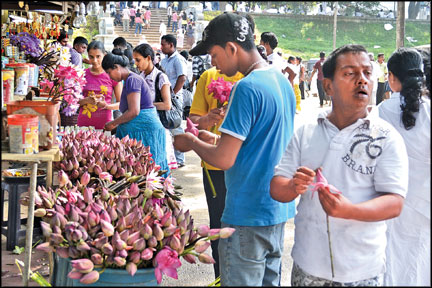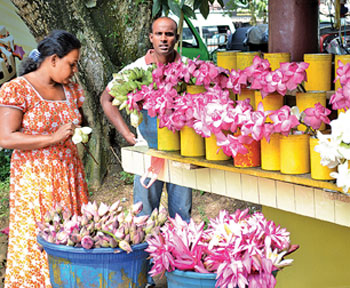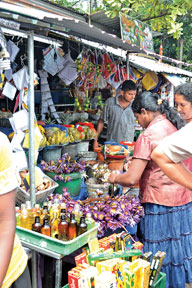
Saying it with flowers
By Ananda KANNANGARA
|

Flower stall
|
|

Lotus flowers at a stall
|
A group of foreign nationals who were on their way to Dalada Maligawa
Kandy stopped at Peliyagoda and inquired from an elderly woman about a
place where they could purchase flowers.
As it was a Full Moon Poya Day the woman was clad in pure white. She
was proceeding towards Kelaniya Raja Maha Vihara to observe sil.
The foreigners introduced themselves as members of a Buddhist
delegation from Thailand. The elderly woman promptly replied that there
was no place to buy flowers other than at the Kelaniya Raja Maha Vihara
premises.
Although some members of the delegation were in Sri Lanka earlier, it
was the first time that they visited the historic Kelaniya Raja Maha
Vihara. They were delighted with various kinds of beautiful flowers
available in the vicinity of the temple.
They were watching with curiosity how devotees purchased beautiful
flowers for religious services at the temple. A member of the tour
group, while buying flowers from a shop asked whether they too could
visit places where flower plants are cultivated.
The foreigners also saw how vendors were selling varieties of
colourful flowers to people coming to the temple, while a group of
school children were distributing flowers and oil lamps free of charge.
Beauty
The Sunday Observer spotted this rare incident of foreigners highly
appreciating the beauty of our local wild flowers and also distributing
them free of charge. They said that they had never seen some varieties
such as nelum (lotus), Olu and Manel in their country.
A member of the group proposed a flower shop owner to take them to
see a flower cultivation.
Kelaniya Rajamaha Vihara premises is not the only place to see
varieties of colourful flowers. Various flowers could also be seen at
places such as Kataragama Kirivehera, Bellanvila Temple, Kalutara
Bodhiya and at the Pillawe Temple at Borelasgamuwa.
|

Flower stall at Kalutara |
The flower business in our country has a long history of over 2000
years. History reveals that even during the periods of kings Dutugemunu
and Devanampiyatissa, villagers were in the habit of picking flowers
from ponds, lakes and rivers and selling them not only to devotees
coming to temples, but also to decorate palaces of kings.
At present flowers are distributed throughout the country from areas
such as Anuradhapura, Polonnaruwa, Talawa , Kurunegala and a few other
places where adequate water resources are available. Most of the local
flowers which are used for religious purposes do not have English names,
they are generally called in their Sinhala names such as Nelum, Olu, Nil
Mahanel and Red Manel, Sudu Manel etc. These flowers are a little
expensive when comparing to flowers that are brought from village
gardens, streams and small lakes. According to statistics, the
livelihood of over 2000 families in the country is selling flowers at
religious places. The available statistics also reveal that in addition
to the Kelaniya Raja Maha Vihara premises, Kalutara and Bellanvila are
the other prominent places that people sell flowers.
An elderly person R. Sumanapala said he is in the flower selling
business at Kelaniya Raja Maha Viharaya premises for the past 13 years.
Income
“There are over 40 flower shops opposite the temple and we do not
have a fixed monthly income. Our daily income depends on the number of
customers visiting our stalls”.
He said flowers are very expensive as they are brought from distant
areas like Anuradhapura and Polonnaruwa .
“During the week days we purchase small stocks of flowers, but during
religious festival seasons and Full Moon Poya days we buy large
stocks,”.
A 56-year old flower seller and a father of two, Y.R. Keerthisena who
sells-flowers at Bellanwila Temple premises said lotus, olu and manel
flowers are very cheap during the season between January and August and
the same flowers are a little expensive during October to December every
year.
|

Flower stall at Bellanwila |
He said during the off-season most flower sellers are used to buy
various other kinds of small village flowers such as saman pitcha, wathu
sudda and asoka mal, since there is a great demand for such flowers from
people live in Colombo.
A 38-year old mother of three children Ramani Dayalatha of Pillawa at
Borelasgamuwa said she has been in the flower selling business for the
past 15 years.
She said Pillawa Temple at Borelasgamuwa has become very popular
among schoolchildren, since many of them come here during GCE (O/L),
(A/L) and Grade five scholarship periods to make vows for their
examinations and also to fulfil them thereafter.
Construct
“There are 27 flower stalls at Pillawa and we have only one toilet. I
appeal to the Divisional Secretariat to consider our pathetic situation
and construct another toilet and a wash room.’
She said unlike in the past, generally the flower selling business is
running at a loss because more traders have encroached the business now.
She also said each stall owner has to pay a monthly rent of Rs. 600 and
Rs. 1,000 and Rs. 750 as an annual tax.
She appealed the Divisional Secretariat to reduce the monthly rent
considering the present situation of their business.
According to a long-standing flower seller, Gunapala Peiris at
Kelaniya, some days a flower seller gets a daily income of Rs. 300 and
during religious seasons some flower sellers earn over Rs. 4000 a day.
He said generally they sell four lotus flowers for Rs. 50 and six
manel flowers for Rs. 20. and none of these flowers could be kept for
more than three days.
According to Gunapala, almost all flower sellers do additional
business such as selling clay pots, garlands, coconut oil, fruits, pooja
baskets in addition to their normal business of selling flowers .
Gunapala also said flower sellers generally get a good income during
Vesak, Poson, Duruthu and Bak Full Moon Poya days, but due to free
distribution of flowers by schoolchildren during these special poya days
most flower sellers face immense hardships.
A flower seller Sunil Gamini at Borelasgamuwa requested the
authorities to help flower sellers to construct houses through Bank
loans.
“As we earn only a meagre monthly income and there is no recognition
to our traditional business, no bank gives housing loans to us.
Therefore, I appeal to the President to look into our problems and help
us.” He also recalled how former President Ranasinghe Premadasa visited
their stall one night and discussed the grievances of flower sellers. He
also helped many of us to construct houses through Janasaviya program.
He said the former President also wanted to give lands to needy
flower sellers. |

